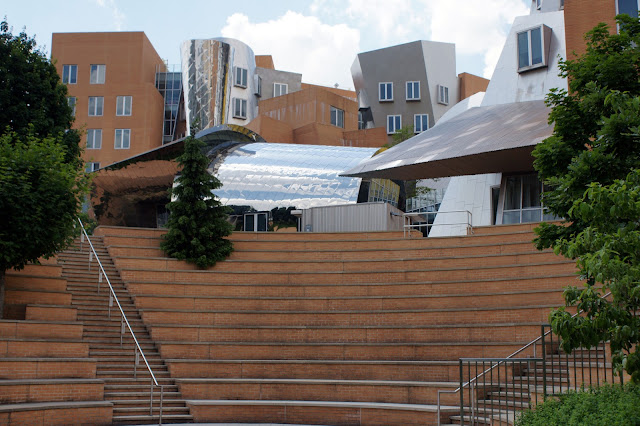Posted by Deirdre Oakley,
CAMBRIDGE, MA – While attending a working meeting at Massachusetts Institute of Technology (MIT) last week, I happened upon the Ray and Maria Stata Center.
It stopped me in my tracks and I said to my colleague “I’ve got to come back
and take some photographs.” This 720,000 square foot building designed by famed
architect Frank Gehry and opened in 2004 is a striking postmodernist structure
of organized chaos with a mix of shapes leaning is many different directions
and made of brick and shining metal. The building is so extraordinary that
tourists from as far away a China flock to it year round. It also houses a
seemingly incongruous group of academic departments and programs including the
Computer Science and Artificial Intelligence Laboratory and the Department of
Linguistics and Philosophy.
The building means different
things to different people, depending on how they experience it, and it has not been
without controversy. It was an incredibly expensive project, although funded
generously by the likes of Ray and Maria Stata, Bill Gates, and Alexander
Dreyfoos. There was a fire sprinkler system failure in 2007 that flooded parts
of the building. MIT subsequently filed a lawsuit against Gehry citing deficient design which not only led to the sprinkler failure but to drainage and falling ice problems as well. Although the
lawsuit was settled in 2010, the structure continues to have as many critics as it does admirers.
And now the building has two
more meanings: one of cold blooded murder, and another of human generosity. While I was
taking photographs I came across a makeshift memorial near the front of the
building. As I got closer I realized it was in memory of slain MIT policeman
Sean Collier, who was shot by the Boston bombing suspects at the corner of Vassar and Main Streets where the Stata Center is located.
Collier was only 26 years old. A subsequent review of surveillance footage
revealed the suspects sneaking up behind Collier’s police cruise, firing at him
five times, and then attempting to take his gun. Collier never had a chance.
While this gruesome killing
certainly has nothing to do with the Stata Center, the homemade memorial to
Collier stands in ironic contrast to its magnificence. It also gives the
building an unexpected vulnerability as a place of reflection, demonstrating that such tragedies can
happen anywhere, as can outpourings of goodwill. Nothing can bring Collier
back but MIT has set up a memorial fund in memory of Collier and the community
continues to generously donate while mourning Collier's tragic death.
Deirdre Oakley is the Editor of Social Shutter and an
Associate Professor in the Department of Sociology at Georgia State University.
She can be contacted at doakley1@gsu.edu. To view more of her photographs of the Stata Center go to the Social Shutter
Facebook page.












No comments:
Post a Comment